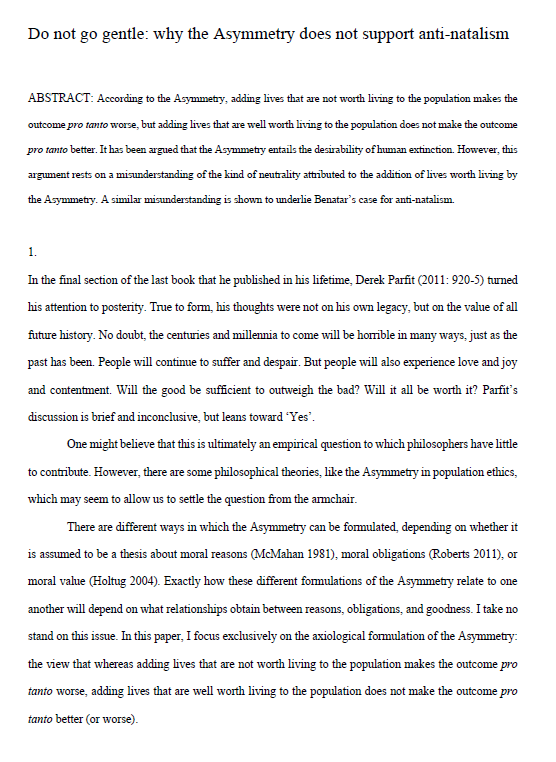Do not go gentle: why the Asymmetry does not support anti-natalism
Andreas Mogensen (Global Priorities Institute, Oxford University)
GPI Working Paper No. 3-2021
According to the Asymmetry, adding lives that are not worth living to the population makes the outcome pro tanto worse, but adding lives that are well worth living to the population does not make the outcome pro tanto better. It has been argued that the Asymmetry entails the desirability of human extinction. However, this argument rests on a misunderstanding of the kind of neutrality attributed to the addition of lives worth living by the Asymmetry. A similar misunderstanding is shown to underlie Benatar’s case for anti-natalism.
Other working papers
Longtermist institutional reform – Tyler M. John (Rutgers University) and William MacAskill (Global Priorities Institute, Oxford University)
There is a vast number of people who will live in the centuries and millennia to come. Even if homo sapiens survives merely as long as a typical species, we have hundreds of thousands of years ahead of us. And our future potential could be much greater than that again: it will be hundreds of millions of years until the Earth is sterilized by the expansion of the Sun, and many trillions of years before the last stars die out. …
Heuristics for clueless agents: how to get away with ignoring what matters most in ordinary decision-making – David Thorstad and Andreas Mogensen (Global Priorities Institute, Oxford University)
Even our most mundane decisions have the potential to significantly impact the long-term future, but we are often clueless about what this impact may be. In this paper, we aim to characterize and solve two problems raised by recent discussions of cluelessness, which we term the Problems of Decision Paralysis and the Problem of Decision-Making Demandingness. After reviewing and rejecting existing solutions to both problems, we argue that the way forward is to be found in the distinction between procedural and substantive rationality…
The freedom of future people – Andreas T Schmidt (University of Groningen)
What happens to liberal political philosophy, if we consider not only the freedom of present but also future people? In this article, I explore the case for long-term liberalism: freedom should be a central goal, and we should often be particularly concerned with effects on long-term future distributions of freedom. I provide three arguments. First, liberals should be long-term liberals: liberal arguments to value freedom give us reason to be (particularly) concerned with future freedom…

